Our long and impactful history presented on the Meals on Wheels of Central Maryland (MOWCM) timeline shows the commitment, enthusiasm, and innovation that MOWCM has embodied from the beginning. Throughout the decades, we have adapted, grown, and deepened our services, building a trusted reputation of reliability and care throughout Maryland. From ten clients in 1960 to thousands today, our evolution has included geographic expansion and programmatic creativity. More than a meal™ support services such as Phone Pals, the Grocery Assistance Program (GAP), Friendly Volunteer Companions, and Kibble Connection provide clients with a sense of security and friendship, reducing the devastating effects of social isolation.
Listening to the changing needs of our clients, we have expanded Home-Delivered Meal Program (HDMP) offerings to include Korean, Kosher, no-fish, no-pork, and texture-modified meals, insuring broad inclusivity. Our case management department works tirelessly to connect our clients to a wide variety of resources, including home repair needs. We have collaborated with healthcare institutions in the Together in Care (TIC) program allowing for our most vulnerable aging adults who may have otherwise fallen through the cracks to optimize their health and remain at home, out of the hospital.
We have consistently shown up for Maryland’s homebound population. Our longevity and proven success prepared us to face the COVID-19 pandemic head-on and gave clients and the community confidence that we would be here when they needed us most.
THE COVID-19 PANDEMIC
When the Coronavirus hit Maryland, everyone was worried, especially our clients. Questions such as “Will MOWCM still deliver?” and “What will I do if grocery stores shut down?” began to flood our Client Services support team with hundreds of calls each day. MOWCM staff were able to assure anxious callers that they would not only be fed, but that we would ensure their safety as we weathered the pandemic together. Sharon Hurd, Assistant Director of the Home-Delivered Meal Program comments, “It was an extremely palpable ease that came over clients as they realized that MOWCM was there for them.”
The huge influx of new client referrals was not only double the usual number, they also included a much higher rate of individuals with urgent needs. Client Intake Manager, Kate Wagner explained the importance of a quick turnaround, “If we were not here, what would clients do? Where would they go?” In a matter of weeks, the number of active clients grew by over 1,500 people. Amazingly, the Client Services team was able to maintain a two-to-three day average from the time a call came in to when clients would receive their first meal.
EMERGENCY RESPONSE COMMUNITY FEEDING TEAM
Because of our trusted presence throughout Maryland, we were quickly called on to respond to the COVID-19 pandemic as a leading member of Maryland’s Emergency Response Community Feeding Team. We built off of long-standing relationships with regional Area Agencies on Aging, asking, “What do you need from us?” We adapted to the rising needs of local seniors, particularly in Baltimore City, by creating a central intake process through Maryland Access Point (MAP), allowing us to serve the most vulnerable clients right away.
As the pandemic unfolded and the number of clients receiving meals rapidly grew, the MOWCM team brainstormed how we would safely and reliably deliver to so many people. We determined that each client would receive one or two weekly frozen meal boxes that contained nutritious meals as well as milk, juice, fruit, and bread. This production decision allowed MOWCM to keep up with the ever-increasing demand by maximizing our delivery fleet. Additionally, new delivery protocols and reduced contact provided safety to clients, volunteers, and staff alike.
TEAM ON THE GROUND
Maintaining such a high volume has not been easy and has required more volunteer and staff involvement than we could have imagined. For instance, hours after their delivery shifts end, drivers can be found helping out in the packing room, pushing carts and loading vans for the next day.
This reality also translated to much longer days and a 7-day schedule for kitchen staff, our drivers, and administration, who actively cooked and packed meals from 7 am to 7 pm, seven days a week.
Kerry Britt, Food Service Director of Trio Community Meals, has been vital in overseeing this incredible feat. When asked how the team has been able to do it, Kerry replied, “Everyone came together quickly and with great communication. It has to get done to feed those in need, so we just get it done.” Markiah Patterson, who also works in the kitchen admits that her job is sometimes challenging, however she loves it saying, “I am passionate about food security and am happy to be a part of an organization where people can be fed.”
